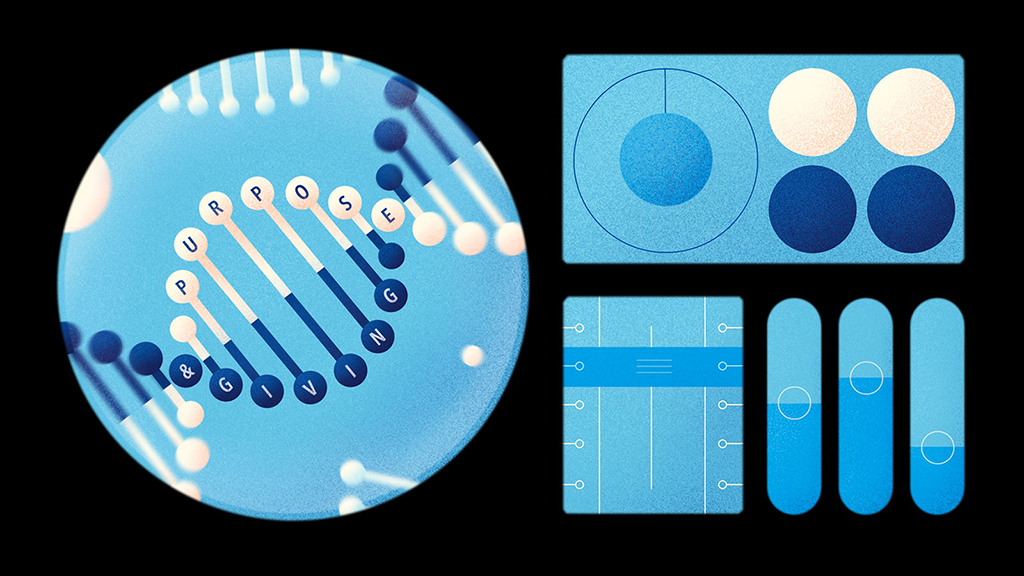By Jordan Moore
Imagine a pill you could take that would increase your happiness, longevity, and quality of sleep. And on top of that, it would decrease your susceptibility to COVID-19, Alzheimer’s, heart disease, and depression. The side effects? More friends and better sex… you’d start taking it immediately, right?
According to Vic Strecher, this medicine exists—but it’s not a pill. And it’s also not something your doctor can prescribe. The medicine is living a more purposeful life. And philanthropy, as it turns out, is one way you can become more purposeful.
Photo provided by Vic Strecher
Strecher (MPH ’80, PhD ’83 ) is a professor of health behavior and health education at the University of Michigan’s School of Public Health. For the last decade, he has been teaching and researching the significance of purpose and how people can find it in their lives. A few months ago, Leaders & Best had a special conversation with Strecher to get the inside scoop.
—
It’s June 20, 2010, just before dawn. Vic Strecher gets out of bed, grabs his kayak and, still in his underwear, sets out for a journey on Lake Michigan. He is in a sort of waking dream, unsure of where he’s headed or why. But he keeps paddling and paddling through the water, in search of something he can’t quite comprehend.
Strecher is a few miles from shore, when, all of a sudden he hears a familiar sound. His kayak almost tips over. It’s the voice of his daughter, Julia. She had died just six months before.
Julia Strecher (School of Nursing Class of 2013) contracted chickenpox at a young age. Along with the rash most commonly associated with chickenpox, the virus tragically attacked and destroyed her heart. She received a heart transplant at Michigan Medicine that added more years to her life. But at 19, she passed away from a heart attack.
Strecher lost all sense of purpose and meaning in his life when Julia died. But on that summer morning ten years ago, after months of feeling alone and directionless, he had something of an epiphany.
“I found a clue on Lake Michigan in my kayak when I felt her telling me that I needed to get over myself, my ‘ego,’” wrote Strecher, in his book Life on Purpose. In search of what that meant, Strecher began delving more deeply into philosophy and psychology, and approaching his research from a more interdisciplinary perspective. “I found comfort in knowing that I wasn’t alone, that in fact philosophers had been examining questions of life purpose for thousands of years,” he wrote. “And that these big questions are now, for the first time in history, being studied using the methods of science.”
—
Since 1980, over 750 scientific articles have studied the role of purpose in our lives. These studies have spanned a wide range of disciplines, from psychology and education to cardiology and epidemiology. “I’m interested in the behaviors people can engage in that make them healthier,” Strecher said.
“And one thing we don’t talk enough about is the importance of being purposeful.”
Across these disciplines, studies most often test for purpose with questionnaires that include statements like, “Some people wander aimlessly through life, but I am not one of them” or “I have a sense of direction and purpose in my life.” Participants then rank how true these statements are on a scale, usually from 1-to-7. It sounds pretty simple. But from this data, we have been able to connect significant positive health outcomes to the degree of purpose someone has in their life.
Here are a few other things we know about the health benefits of purpose:
Heart Disease: Adults have been found to have a significantly lower risk of dying from heart attacks and strokes if their lives are filled with purpose.1
Alzheimer’s Disease: In retirement, seniors are up to 2.4 times less likely to develop Alzheimer’s if they are purposeful.2 & 3
Diabetes: Diabetics with a high sense of purpose have an easier time stabilizing their blood sugar (hbA1c) levels.4
Staying young: Purposeful individuals are better at repairing their DNA, which means they experience a slower rate of aging, among other effects.5
Better Sleep: People with purpose in their lives have a longer duration of REM sleep.6
Recently, researchers have also discovered that people with a strong purpose in life generate antibodies that strengthen our immune system and equip our bodies to fight various diseases.
“Antibodies come in handy in a pandemic,” Strecher said. “Will having a strong purpose in life protect us from the deleterious effects of COVID-19? We don’t know.” But it probably wouldn’t hurt to consider a strong purpose in your life.
—
All of this seems pretty great, but… What exactly is a purpose? And of course, how does one, well, get it?
There are a lot of definitions of purpose out there. Strecher describes it as the central self-organizing aim in your life. Think of it as a combination of two things: theme and direction.
Theme corresponds to what matters the most to you—what you value. It may be a specific cause you care about, or perhaps it’s your job. But at the end of the day, your theme is the values and passions that make you who you are.
Direction is how you live out your theme and practice what matters most to you. This could be, for example, what you do with your free time or what you spend your money on. In other words, it’s the motivation behind how you use your resources.
“It turns out that having a purpose is pretty straightforward,” Strecher said. “If you identify what you care most about and then set goals around those things, you can more easily remove the distractions in your life and work toward living for what matters most to you.”
—
Scientific studies often classify purposeful activities in two categories: eudaimonic and hedonic. Where eudaimonic actions are often directed outward to other people, hedonic actions are usually geared inward, toward yourself. Now both of these are important to living a vibrant life, but research suggests that the most meaningful purpose is the kind that is directed toward other people. This was Strecher’s epiphany on Lake Michigan: to begin living for others instead of himself. He describes this as self-transcending vs. self-enhancing purpose. And this self-transcending purpose is often found in philanthropists.
“Giving to others is by nature self-transcending,” he said. “And people with a strong self-transcending purpose seem to have this set of biological mechanisms that are much stronger than people who are simply into just pleasure and immediate satisfaction.”
There’s a lot of data out there on the health benefits of giving. One that Strecher often cites is a 2014 study on neural sensitivity to eudaimonic and hedonic behavior.7
In the study, researchers connected participants to an MRI scanner so they could observe neurological activity in their ventral striatums (VR)—the brain’s reward center. Then, they asked participants questions about giving and receiving money. Questions like, if you were giving money, who would you give it to, and why? And if you were to receive money, what would you spend it on, and why?
The study discovered that some of the participants’ anticipation of giving stimulated high activity in their VR, which meant they were getting a high neurological reward for thinking about giving. And for others, it was the opposite: the anticipation of getting money resulted in high VR activity. At the end of the study, researchers discovered that participants who experienced more reward for thinking about giving money had fewer depression symptoms than those who experienced reward for receiving money.
So yes, it’s actually healthy to give money. “Brains don’t lie,” Strecher said. “If you start giving carefully, and you’re giving to causes that you’re passionate about, this is really good for you.”
Philanthropy is healthy, in part, because it offers ways to actually practice living for other people. After all, if you break down the word philanthropy, it’s definition is quite literally “love of humanity.”
Philanthropy is also healthy because it helps people discover their purpose. Whether your passion is public health, athletics, or music, philanthropy empowers people to discern where they find meaning in life.
“When you’re building a purpose, it’s important that you decide what your purpose is,” Strecher said. “Good philanthropy lets people choose how they spend their time and money, and then it creates ways for them to have a real impact where it means the most.”
—
While researchers continue to discover more each year about the positive outcomes of purpose and giving, we still know very little about why these benefits occur.
“All this data is suggesting purpose is really good for you, but we don’t know why,” Strecher said. He calls these the “mechanistic questions” underlying purpose. “We’re starting to learn, for example, that people can strengthen their purpose in life and that this is associated with an increase in telomerase, an enzyme that fuels the repair of our chromosomes—but how come? We just don’t know that yet.”
While it may be years before we understand all the reasons why purpose is so good for us, health experts like Strecher remind us that living purposefully is one of life’s most rewarding endeavors. So next time you’re volunteering or giving back to your favorite organization, remember that the life you impact most might in fact be your own.
For more about purpose, check out Strecher’s online Coursera class, Finding Purpose and Meaning in Life, or his app, Purposeful, designed to help people build purpose into their daily lives.
Research:
1. E. S. Kim, J. K. Sun, N. Park, and C. Peterson, “Purpose in Life and Reduced Incidence of Stroke in Older Adults: The Health and Retirement Study,” Journal of Psychosomatic Research 74 (2013): 427–32.
2. P. A. Boyle, A. S. Buchman, L. L. Barnes, and D. A. Bennett, “Effect of a Purpose in Life on Risk of Incident Alzheimer Disease and Mild Cognitive Impairment in Community-Dwelling Older Persons,” Archives of General Psychiatry 67, no. 3 (2010): 304–10.
3. P. A. Boyle, A. S. Buchman, R. S. Wilson, L. Yu, J. A. Schneider, and D. A. Bennett, “Effect of Purpose in Life on the Relation Between Alzheimer Disease Pathologic Changes on Cognitive Function in Advanced Age,” Archives in General Psychiatry 69, no. 5 (2012): 499–505.
4. N. H. Rasmussen, S. A. Smith, J. A. Maxson, M. E. Bernard, S. S. Cha, D. C. Agerter, and N. D. Shah, “Association of HbA1c with Emotion Regulation, Intolerance of Uncertainty, and Purpose in Life in Type 2 Diabetes Mellitus,” Primary Care Diabetes 7, no. 3 (2013): 213–21.
5. T. L. Jacobs, E. S. Epel, J. Lin, E. H. Blackburn, et al. “Intensive Meditation Training, Immune Cell Telomerase Activity, and Psychological Mediators,” Psychoneuroendocrinology 36 (2011): 664–81.
6. E. S. Kim, S. D. Hershner, and V. J. Strecher, “Purpose in Life and Incidence of Sleep Disturbances,” Journal of Behavioral Medicine 38, no. 3 (2015): 590–97.
7. E. H. Telzer, A. J. Fuligni, M. D. Lieberman, and A. Galvan, “Neural Sensitivity to Eudaimonic and Hedonic Rewards Differentially Predict Adolescent Depressive Symptoms over Time,” Proceedings of the National Academy of Science, 2014.

